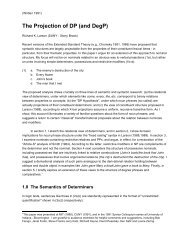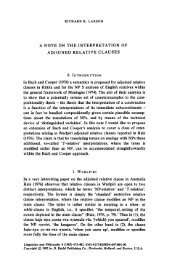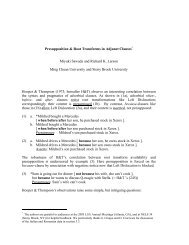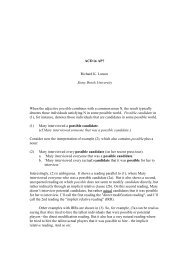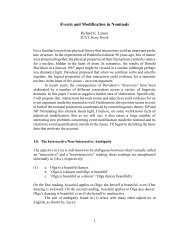Intensional Transitive Verbs and Abstract Clausal Complementation
Intensional Transitive Verbs and Abstract Clausal Complementation
Intensional Transitive Verbs and Abstract Clausal Complementation
You also want an ePaper? Increase the reach of your titles
YUMPU automatically turns print PDFs into web optimized ePapers that Google loves.
<strong>Intensional</strong> <strong>Transitive</strong> <strong>Verbs</strong> <strong>and</strong> <strong>Abstract</strong> <strong>Clausal</strong> <strong>Complementation</strong><br />
(92) a. Max [ VP expected [ CP [ C’ FOR [ AgrsP PRO TO [ VP HAVE an airplane]]]]]<br />
b. Max [ VP expected [ XP an airplane X STAGE-LEVEL ]]]<br />
6.0 Extensions <strong>and</strong> Further Questions<br />
Thus far we have shown the plausibility of a covert clause analysis for certain core cases of intensional<br />
transitive verbs. Quite apart from the intrinsic interest of this project, these results appear to lend support<br />
to the broader hypothesis that intensionality effects may be universally correlated with clausal<br />
complementation. This in turn raises certain interesting conceptual issues about the foundations of<br />
semantic theory. Specifically, are so-called sententialist theories of intensional environments adequate,<br />
or do we also need to invoke the resources of abstract intensional objects <strong>and</strong> possible worlds<br />
semantics? 41 Partee (1974) puts the issue in the following way:<br />
"As far as I know, there aren’t more than one or two dozen verbs like look for; I have only<br />
been able to find look for, search for, seek, hunt for, hunt, ransack...for, rummage about for,<br />
advertise for, listen for, guard against, <strong>and</strong> owe. If these verbs were missing from the<br />
language, or if their syntax were slightly different, then there would seem to be no empirical<br />
difference between the theory that all opacity results from sentence-embedding <strong>and</strong> the<br />
theory that intensions are centrally involved in the semantic interpretation of all or most<br />
grammatical relations. Since these two hypotheses are linked with very different views about<br />
the degree of abstractness needed in syntax for natural languages, basic questions about the<br />
relation between syntax <strong>and</strong> semantics in natural language are at issue. Although I believe I<br />
have shown that the balance of the available evidence goes against the hypothesis that all<br />
opaque contexts are sentential contexts <strong>and</strong> in favor of basic grammatical relations being<br />
intensional, it is certainly to be hoped that clearer kinds of evidence on the question will<br />
eventually be discovered. (p.??)"<br />
What we have shown thus far seems to suggest that, contrary to Partee’s assumptions, a sentenceembedding<br />
account of opacity is possible - indeed correct - in all of the cases that she mentions. But the<br />
question remains: Can all cases of opacity be assimilated to cases of clausal complementation? In this<br />
final section we examine a number of additional cases which appear to be obstacles to such assimilation,<br />
<strong>and</strong> we offer some speculative remarks on how these obstacles might be overcome.<br />
6.1 Two More Classes of <strong>Intensional</strong> <strong>Transitive</strong> <strong>Verbs</strong><br />
Psychological predicates like fear, worry-about, love, despises, frighten, irritate, please, etc. (93)-(94)<br />
present interesting questions for the account given here: 42<br />
41See the introduction to section 6 of Ludlow (1997) for a general discussion of these two approaches to<br />
intensionality.<br />
42Some researchers have questioned the status of psychological verbs as intensional. Thus Forbes (1997b)<br />
expresses doubts similar to those of Zimmermann (1995) about the availability of narrow scope readings (what<br />
Forbes refers to as "notional readings") with examples like (i):<br />
(i) Perseus fears a gorgon.<br />
35



